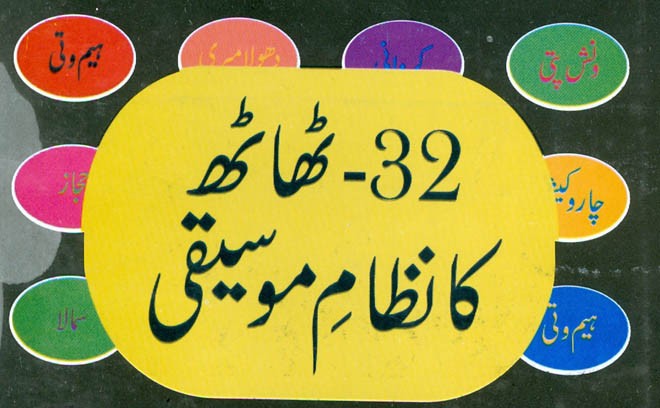
Ustad Ghulam Haider Khan’s book is an insightful endeavour by a musician who is also well-versed in theory

Ustad Ghulam Haider Khan has been involved with music on a very serious level. He runs the Classical Music Guilt, a forum for hosting programmes of classical music and has been associated with the Classical Music Research Cell, Radio Pakistan Lahore in pursuit of his scholarly interest in music.
In our music tradition, there has been a kind of dichotomy between the thinker and the practitioner. It has been rare that the two have come together. Thinkers who can be categorised under the nomenclature of present day ‘musicologists’ were scholars who thought about music, pontificated upon it and laid down the guidelines of the expression according to their understanding of the medium. In most cases, though, these parameters, markers, benchmarks or the criteria were derived from other disciplines which may have been their strengths like many borrowed expressions from religions, others from some political ideology, and some from disciplines like poetry. These were then applied to the musical forms and expressions thus laying down the basis of their critical canons. People well-versed in some other disciplines or with well-grounded and rounded personalities have discussed the state of music in their times.
It has been rare that musicians themselves have also played the vital role of musicologists. This has been usually the case usually in Muslim societies. Non-musicians have usually pontificated upon what music is, what its role is supposed to be and what are the dos and don’ts of being either practitioners or listeners. Many like Al-Ghazali, Ibn-e-Sina and Al-Kindi who have written with profundity on music in this tradition have borrowed terms and concepts from scholasticism, philosophy, ethics, or mathematics to prove the validity of their arguments. Among Muslims, the practice of music has been considered low-brow while thinking about music, its structure, and its principles of harmony and rhythm in refracted forms was considered very prestigious and has continued to fascinate them. It has taken the scholars beyond the institution of it as a practicing and a performing art. It is difficult to understand as to how they reconciled their two stances, and how these abstract concepts or canons were related to the experience of creating or appreciating music. Whether it was or is wholly possible to experience something conceptually without being physically involved is questionable and on the surface may defy reason.
Mercifully, there is no such dichotomy or apparent contradiction where Ustad Ghulam Haider is concerned. Hailing from a family of musicians, he has been relentlessly paying attention to the various aspects of music, its development, its history and the various outstanding musicians who have shone on the firmament ever brightly. For the past many years, his passion for a critical understanding of issues involving music has taken him to work at the Classical Music Research Cell, a place or an institution that was created for this specific purpose but did not live up to its initial expectations because those who followed the founding fathers were not up to the task. The team created by one of the founding fathers, M. A. Sheikh -- despite all the challenges, limited resources and marginalisation -- persisted in the pursuit of their passion or commitment. Very few out of that set have survived and one such from amongst them is Ustad Ghulam Haider.
The history of music has undergone many changes in the last hundreds of years but these have not been documented which has left gaps sadly filled in by guesswork, and at best -- extrapolation. This has been further compounded by the total lack of scholarship regarding music in Pakistan because the society and state’s cultural profile did not really include the very rich heritage of music. It was left to others to fill in and what was a tradition fostered in the subcontinent became a tradition of all other communities except the Muslims. The practice of music continued, nevertheless, but its scholarship was not adequately backed by the support of the classes that mattered. This ambivalence has pushed the arts -- particularly the performing arts -- in the shadow land of a forbidden activity.
The ten thaats of music as delineated by Pandit Bhatkhande have been the standard system of classification followed in the last one hundred and fifty odd years but since the practice of music precedes the theory of music, huge gaps have been detected in that standard classification as well. Many scholars have come up with many more fundamental scales to support a musical practice that always hovered over and above its theoretical underpinning. Many others have opted for other and more fundamental scales than the ten thaats and Ustad Ghulam Haider; also joining the scholarly pursuit has come up like some others with thirty two fundamental scales labeled by him as thirty two thaats.
As if to provide a proper backdrop, the author has included two articles "Safar-e-Mauseeqi" and "Hamari Mauseeqi" to put his endeavour in a proper perspective. The journey of music has to be seen in the form of an evolution and the effort of discovering true music or some pristine system can only end up in a construct. Ustad Ghulam Haider too has adopted a historical approach and the changing nature of music does become dramatically more obvious if done so
Even now in this age of globalisation, the insularity of various musical systems has been hugely frayed at the edges and a new system with many new forms is in the process of emerging. The author has penned many books like "Tazkea-e-Mauseeqi", "Qasoor Gharane Ke Naamwar Funkaar", "Kahet Sadarung", "100 Achoob Raags" and "Naghmaat-e-Khusro". With a keen eye on the history and now the fast-changing musical environment, it is expected that the passion of music will flower in many more books that raise potent questions and also show the way to find possible solutions as well.